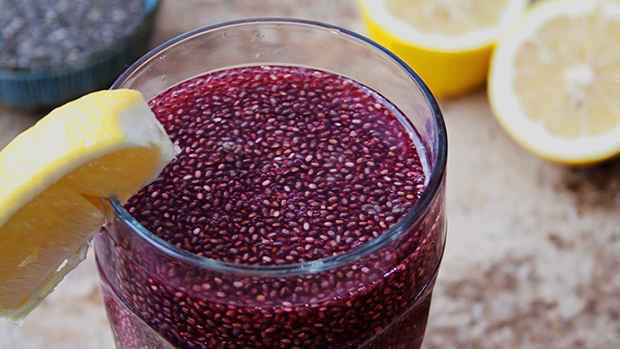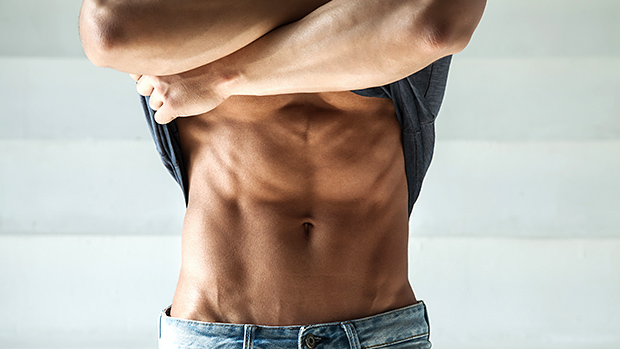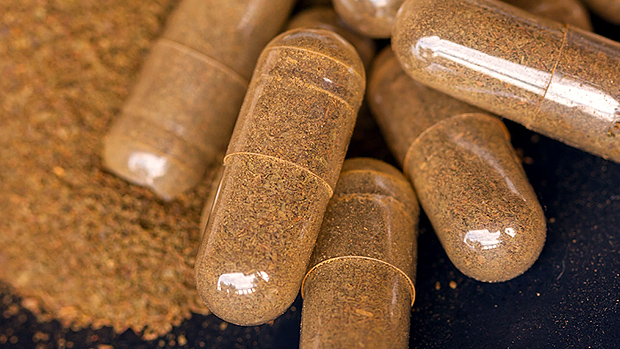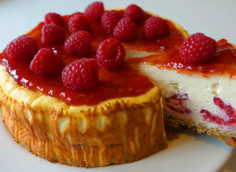Most newspaper movie reviewers and restaurant critics use the "star" system to evaluate the merits of whatever film or eatery they're critiquing. This system is so widely used that practically any member of Western society automatically knows that a "4-star" restaurant is serving up some pretty good eats, or that a 4-star movie is probably going to make boffo box office.
Conversely, a 1-star restaurant is most likely to be found along the highway with EAT spelled out in 10-foot high letters. Similarly, a 1-star movie is likely something that started as a Saturday Night Live skit and found its way to DVD format in about a week.
However, the "star" system is a little too conventional for us here at Testosterone. It lacks, shall we say, a certain testicularity. We need a rating system with a little more oomph and a lot more balls.
Enter the nutsack rating.
What I'm going to do, from time to time, is to evaluate various nutritional supplements, chemicals, ingredients, foods, or practices. As you might have guessed, a 1-nutsack rating conveys lameness whereas a 4-nutsack rating conveys both quality and ballsiness (remember, each nutsack, with few exceptions, contains TWO balls—that's double the quality!).
Let's see what's at the bottom of our gym bag this month.
Bad Seed?
Let's see, I've been given a chia Scooby Doo, a chia Mr. T, a chia rabbit, a chia Barack Obama, and even an X-rated chia vagina, all of which I dutifully tended and grew to their botanical potential.
But never did I think of actually eating the seeds from which sprung all that tiny, green, fur-like foliage.
Turns out I wasn't the nutritional visionary I thought I was, because chia seeds are the hot new thing, the seed du jour. Flax seeds? That's so 2009, swine.
Chia, allegedly the staple of the Aztec and Mayans, is being touted for its ability to lower cholesterol and blood sugar, its super-high antioxidant content, and its chock-fullness of omega-3 fatty acids. Oh yeah, and it has no flavor and it's easily digested.
Sound good? Sure, but the trouble is, there's a bad yang to chia's good yin.
First of all, for a lot of people, chia seeds are not easy to digest. Eating them can cause gas pain so severe that, like Sheldon in The Big Bang Theory after eating a bowl of broccoli sprouts, you'll think you're suffering from a ruptured appendix.
I swear, you walk behind somebody who's supplementing with chia seeds and there's a fair chance your face will end up looking like that Zao dude in the Bond flick, Die Another Day, only instead of diamonds in your face you'll have chia seeds that will surely sprout and turn you into a living chia pet.
It could happen.
Here's a preemptive test: swallow the sole of an old, worn out Converse Chuck Taylor basketball shoe. If you can digest it with little to no discomfort, then you can probably tolerate chia seeds.
Secondly, chia seeds lower blood pressure, which for most people is a good thing. However, chia is so effective at lowering diastolic blood pressure that it could actually cause problems in some individuals.
And most troubling, at least for me, is the study in the Netherlands conducted by the Wageningen Centre for Food Sciences that chia seeds increase the threat of prostate cancer. Obviously, one study does not a product make or break, but it sure can make you wary, as this one did.
If you're currently using chia, you might want to think twice about continued used. Unfortunately, quitting isn't that easy because the seeds are also addictive.
Needless to say, I'll be keeping the chi-chi-chia seeds on my decorative chia planters and using a combination of flax seeds and Flameout capsules to meet my omega-3 fatty acid needs.
Go ahead and use chia seeds if you don't have a prostate, have stable or high blood pressure, and have the gastrointestinal fortitude of a garbage compactor. If you do use them, however, make sure you grind them up first with a coffee bean grinder, mallet, or bulldozer.
NUTSACK RATING FOR CHIA SEEDS:
Super Protein
People have been debating the merits of various proteins ever since the first meathead picked up a piece of iron. Some swear by the anabolic effects of eggs, others by meat or casein. More recently, whey has picked up an impressive number of advocates, as has soy (although the soy fans usually wear silk underwear and gather together at Derek's house on Tuesday night to watch Glee).
Part of the protein debate also hinges heavily on the forms of said proteins, with words like isolates and concentrates becoming part of the weight lifter's lexicon.
Admittedly, it can get rather confusing.
I'm here, however, to tell you that the current, pretty much hands-down champ is called Casein Hydrosolate, and you can find Biotest's customized, supercharged version of it in various Biotest products like Anaconda and MAG-10.
Now whey protein is way cool because it has some really intriguing immuno-active fractions. It's also fast-acting, which is important, particularly in the peri-workout period.
Hydrolized casein, though, is wicked fast, and it'll increase plasma amino acid and insulin levels far more than intact protein. And that's just conventional casein hydrosolate. Biotest has turned casein hydrosolate into jet fuel by customizing it to contain higher amounts of leucine and phenylalanine.
Here's what independent studies have told us regarding protein kinetics:
The faster acting the protein, the less the absorption by the splanchic bed, which constitutes the liver, stomach, intestines, spleen, and portal-drained viscera in general.
Offhand, "less absorption" by the splanchic bed sounds like a bad thing, but it's not.
Generally speaking, the splanchic bed will sequester proteins; it's called "first-pass extraction."
The end result is that this extraction prevents the protein and amino acids from getting directly to the blood stream, where they'd normally be shuttled off to your muscle cells.
This effect is by no means small as it can be responsible for between 20 and 35 percent of whole-body protein turnover and energy expenditure. That's normally fine and dandy, but we're concerned with building muscle here, and we'd rather the splanchic bed keep its amino-grubbing hands off our protein.
So if you have an extremely fast acting protein like casein hydrosolate, you avoid much of this splanchic extraction, resulting in a huge bolus of aminos in your blood and, ipso facto, in your muscles.
This pretty much beats the snot out of the notion that an amino acid is an amino acid, no matter how it's administered.
Clearly, casein hydrosolate, particularly Biotest's supercharged version, is easily the best protein to put in your tank for muscle building right now.
NUTSACK RATING FOR CASEIN HYDROSOLATE:




Up Yours, Jamba Juice!
My little pamplemousse.
That's what I call my girlfriend when we're getting intimate.
It's French.
No matter that it means grapefruit, it sounds sexy and it makes her writhe on the bed sheets like a worm on a hot sidewalk.
Speaking of grapefruit, it's the one fruit juice I keep on hand because I'm a supplement extremist. In other words, I like to maximize the effects of my supplements and there's a good chance that grapefruit juice, or more specifically, an ingredient in grapefruit juice, does just that.
The chemical is called bergamottin and it inhibits the action of an enzyme called cytochrome P-450 from doing its job, which is to break down chemicals into non-active forms. In fact, drinking an 8-ounce glass of grapefruit juice with your supps or meds could increase the amount of active chemical in your bloodstream by fourfold.
For the most part, we don't know exactly how many drugs or chemicals are affected by bergamottin, but there are a lot and there's a good chance its involved in breaking down whatever supplement you're currently taking.
As an example, taking a Viagra pill with grapefruit juice would likely make your erections last even longer. Of course, if you need to have an erection last more than 4 hours, you're just showing off. Really.
So yeah, I often wash down my supplements with an 8-ounce glass of grapefruit juice.
Conversely, both orange juice and apple juice have been shown to have the opposite effect in that they inhibit various drugs and/or supplements from having their full effect.
The negating effect seems to be more "mechanical" than enzymatic in that apple juice and orange juice somehow prevent certain compounds from entering the bloodstream.
As if that isn't reason enough to be careful about drinking apple or orange juice, these juices also wreak havoc on your insulin levels. While whole oranges or apples are great (except when taken at the same times as your prescriptions or supplements), consuming them as juice is an entirely different situation.
The glycemic index and/or insulin index of most whole fruit is great, but once you juice them, you make them easily digestible, so much so that the sugars are quickly absorbed, resulting in an insulin surge that's not too different from the one you get from drinking an entire Big Gulp of Pepsi.
Grapefruit juice, however, is glycemically "safe" in that it doesn't contain many sugars.
Here's my recommendation: Take your prescriptions or supps with water instead of orange juice or apple juice. If you insist on drinking either of those two juices, drink them a full two hours before taking your pills.
If, however, you're a supplement kamikaze and what to maximize the effects of your supps, take them with 8-12 ounces of grapefruit juice. I urge you not to do this with your prescription meds, though, as grapefruit juice might raise the level of the drugs in your bloodstream to unsafe levels.
If you're a dieter or concerned with your blood sugar for any reason, avoid sweet tasting fruit juices in general and opt for their whole-food counterpart.
Speaking of apples, Apple computer founder Steve Jobs named the company after his favorite fruit. After high school, Jobs worked in an apple orchard where he experimented with an all-apple diet, believing it might eliminate his need to bathe. It didn't work.
NUTSACK RATING FOR ORANGE JUICE AND APPLE JUICE:


CAUTIONARY NUTSACK RATING FOR GRAPEFRUIT JUICE:




Your Liver is so Dead and Black That if I Put My Ear to Your Stomach, I Can Hear it Say, "Whatchu Talkin' About, Willis?"
If you walk into an average health food store, it's almost a certainty that there's going to be some cheery woman behind the counter who uses soapwort and sassafras infused shampoo and doesn't shave her legs or her armpits and is wearing a dress made out of naturally dyed hemp who's telling some customer that he needs to detoxify his liver, blood, and/or intestinal tract.
Oh puke.
I'm not sure where people like her get this stuff.
I'm assuming that these arm-chair dietitians who go around preaching the virtues of detoxification believe that ingesting some biological janitor-in-a-drum — beet juice, perhaps — think that it's going to go into your bloodstream, soak up all the bad chemicals like one of those convicts in orange suits you see picking up trash along the highway, and eliminate them through your urine, or worse yet, out of your colon in a nice, twine-bound, lavender-scented packet.
I hate you detox people, okay?
You don't need beet juice or high colonics or fasting to eliminate toxins. Granted, these toxins do exist, and unless you live in some agrarian community in some unspoiled part of the world where there are no factories or pollution, you're going to be exposed to man-made chemicals in your food or your water or your air.
That's a given, but the liver does a fine job in eliminating them; that's what it's there for. Likewise, the bowel self cleans. That's what it evolved to do.
That being said, the liver does need support in its detoxification efforts, but that support consists mainly of "feeding" it high quality protein, something that I venture everybody reading this already does as part of his or her lifestyle.
The high-quality protein provides amino acids that make toxins more water-soluble so they can be eliminated by the bile produced by the liver. Adding antioxidants to your daily diet is also a good idea, as this process has been shown to produce scads of free radicals.
Also, it couldn't hurt to ingest adequate amounts of dietary fiber to prevent dietary toxins from being absorbed in the first place. Pro-biotics, in the form of yogurt, can also help transform some of these toxic compounds into something more benign.
Now it is true that losing body fat, particularly when it's a rapid loss of body fat, can increase the amount of toxins found in the bloodstream. It's been shown that middle-aged individuals, when experiencing rapid weight loss, showed traces of pesticides in their blood stream that hadn't been used in commercial farming since the 1970's.
In people like that (who are experiencing rapid fat loss), it would be all the more important to get adequate amounts of high-quality protein, water, and antioxidants.
NUTSACK RATING FOR DETOX PROTOCALS:

Pass the Koutchie on the Left Hand Side
By the time this column is posted, Californians may well have approved Proposition 19, which calls for the legalization of marijuana.
Even if it didn't pass, it's extremely easy to get a prescription for marijuana. There are even commercials on late-night TV advertising "full service" marijuana dispensaries where you can come in with or without an appointment, describe your alleged ailment to a doctor, get a prescription, and walk out with some primo pot in less than 30 minutes.
There are similar situations around the country.
As such, I get a lot of questions about pot's effects on weight lifting and body comp, most questioners hoping against odds that I'll give them a thumbs-up.
Would that I could, stoners, would that I could.
It's not that I have anything against pot; it's just that I don't think it blends well with bodybuilding.
For one thing, there's the smoke itself. The point of smoking pot is to hold it in your lungs as long as you can, an act that almost always ends in the smoker making hacking noises similar to Val Kilmer's Doc Holliday character in the movie, Tombstone.
Easy lunger, easy.
Do this frequently enough, and a chronic cough and copious sputum production become the norm, and you don't need Doc Holliday or any doc, for that matter, to tell you that unhealthy lungs aren't conducive to strenuous activities.
Of course, pot smokers, unless they smoke several joints a day, don't even come close to ingesting the amount of smoke the average tobacco smoker does.
Another problem with pot is that it causes hyperphagia, which is a cool word for the munchies, and why, if this prop passes, I'm going to invest in General Mills stock because their evil food alchemist have combined salt, butter, caramel, and starch to make Sweet and Salty Caramel Bugles. That stuff is like crack, even if you're not experiencing the munchies.
Anyhow, this hyperphagia also leads to preferentially storing fat around the organs, which may be good if you're a crash test dummy.
Couple a prodigious appetite with the lack of motivation that typifies pot smokers, and you've got a lifter who just doesn't feel like lifting.
If that stoned lifter were to somehow gather up enough willpower to head to the gym, he'd best be careful because his pot-induced blood pressure increase and reduced oxygen capacity have increased his chances of having a heart attack five-fold.
Lastly, there's the hormonal issue. For years, pot's been said to increase estrogen levels. This belief seems to stem back to a letter that appeared in JAMA in the 70's. A doctor wrote that he'd examined two male patients with gynecomastia and that both were pot smokers. From that scant bit of evidence came the pot-and-estrogen link.
Subsequent studies have shown mixed results. However, U.C.L.A. performed a relatively recent study where study participants each smoked five marijuana cigarettes a day for three months. After four weeks, researchers noted significant drops in luteinizing hormone (which spurs the testes to produce Testosterone), followed a week later by a drop in Testosterone.
This makes me wonder about the pot/estrogen link, because a supposed pot-induced rise in estrogen levels would have signaled an increase in luteinizing hormone production, which in turn would have led to increased Testosterone production. Of course, pot may somehow be causing Testosterone to be converted into estrogen at an enhanced or accelerated rate.
Regardless, it's not good. If you're going to smoke pot, do it recreationally, occasionally, and without deluding yourself that it's congruent with your goals as a lifter.
MARIJUANA NUTSACK RATING: 0 NUTSACKS
Vitamin D-lightful
I don't know how it is that we people who supposedly know something about nutrition pretty much ignored Vitamin D for so long. It's like one of those teen movies where you have a girl in your gang that wears glasses and keeps her hair in a ponytail. No one thinks she's pretty until it's prom night and she puts in contacts, lets her hair down, slips on a push-up bra, and puts on a nice butt-twitcher of a dress.
Suddenly, she's popular and everyone wants to bang her.
Same thing with Vitamin D, except for the banging part. I'm telling you, if there's one thing you could take to prevent and possibly treat a whole host of diseases ranging from cancer, heart disease and stroke to osteoporosis, multiple sclerosis, and psoriasis, it's Vitamin D.
The trouble is, it's a little hard to get sufficient amounts. Sure, sunlight produces tons of it in your skin, naturally. The UVB rays hit your skin and produce the natural version of Vitamin D, choleocalciferol, otherwise known as Vitamin D3. As little as 10 minutes in the summer when the sun is high in the sky—just enough time for your skin to start to turn pink—and you produce about 20,000 IU, which is about a 100 times more than the government says you need (they're wrong, though, about how much you need).
The trouble is, it's not always summer, and if you live north of an imaginary line stretching from Northern California to say, Boston, the winter sun will never allow for adequate Vitamin D production. Likewise, the older and/or heavier you are, the less your skin produces.
You may wonder how (probably not, though) fur bearing animals and birds get Vitamin D. Interestingly, they make it in their fur or feathers and then eat the vitamin by licking their fur or preening their feathers!
But back to humans.
There are other impediments to getting enough Vitamin D, also. For one thing, given that everybody's freaked out about skin cancer, most of the population wears sunscreen, which effectively blocks Vitamin D production.
Likewise, most lifters, if they drink milk, drink non-fat milk, which presents a weird problem. Vitamin D is fat soluble (as is the other milk vitamin, Vitamin A), so when you remove the fat from milk, you also remove the fat-soluble vitamins. In an effort to counter this, dairies add Vitamins D and A back to the milk. The trouble is, you need fat to absorb the vitamins!
So unless you ingest fat with your meals, you're not absorbing the vitamins.
There are foods that contain appreciable amounts of Vitamin D including herring, salmon, and whole eggs, but you'd have to eat unrealistic amounts of them to get the amounts most nutritionists are now recommending.
For years, the government's suggested intake of Vitamin D was a paltry 200 IU a day, but that was bumped up to 400 IU in 2008.
However, most legitimate experts now recommend between 800 and 1,000 IU a day, but we at Testosterone recommend at least 2000 IU of Vitamin D3 a day. Biotest researcher Tim Ziegenfuss, however, routinely takes 8000 IU a day, with the aim of keeping his levels roughly at 50 ng/mL of blood.
The best thing to do, though, would be to get your doc to order a blood test for Vitamin D the next time you have a physical. In the meantime, start taking the D.
VITAMIN D3 NUTSACK RATING:




That's all I've got this time. May your nutsack be bountiful and never flap loosely in the wind.





